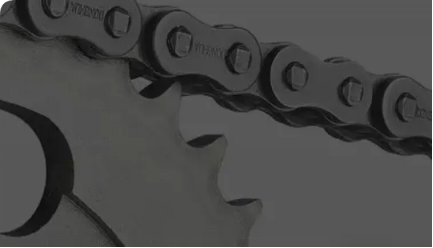Hot Keywords:
- All
- Product Name
- Product Keyword
- Product Model
- Product Summary
- Product Description
- Multi Field Search
Views: 1 Author: Site Editor Publish Time: 2024-11-25 Origin: Site
Selection of Sprockets of Different Materials and Their Applications

A sprocket is a wheel with integrally formed teeth, used to engage with accurately pitched blocks on a link chain or cable. Due to its unique structural characteristics and wide range of application fields, the sprocket plays a crucial role in industrial production. Sprockets made of different materials have different physical and chemical properties and are suitable for different working environments and transmission requirements. This article will introduce in detail several common sprocket materials and their selection principles and discuss their applications in different fields.
Ⅰ.Cast Iron Sprockets Cast iron is a common material for sprockets, featuring low cost and good casting properties. However, cast iron sprockets have relatively poor wear resistance and are prone to wear under high-speed operation or heavy load conditions. Therefore, cast iron sprockets are mainly applicable to some low-speed, light-load transmission scenarios, such as some simple conveying equipment or small mechanical devices. In practical applications, cast iron sprockets are often used for sprockets with low precision requirements or complex shapes, such as ring sprockets. Despite their limited wear resistance, cast iron sprockets are still an economical and practical choice in some situations where cost requirements are relatively strict.
II. Cast Steel Sprockets Cast steel sprockets have high strength and toughness and can withstand large loads and impact forces. In addition, cast steel sprockets also have good wear resistance and corrosion resistance, making them suitable for various harsh working environments. Therefore, cast steel sprockets are widely used in heavy-load, high-speed transmission systems, such as large mechanical equipment, heavy transport equipment, etc. The material selection of cast steel sprockets usually depends on specific transmission requirements and working environments. In situations where large impact loads need to be withstood, low-carbon steel and low-carbon alloy steel can be used for carburizing and quenching treatment to improve their hardness and wear resistance. While for sprockets that do not need to withstand excessive impact and are of medium speed and larger size, medium-carbon steel and medium-carbon alloy steel can be used for quenching and tempering treatment to balance strength and wear resistance.
III. Stainless Steel Sprockets Stainless steel sprockets have good corrosion resistance and oxidation resistance and can work stably in humid, acidic and alkaline and other harsh environments. In addition, stainless steel sprockets also have high strength and hardness and can withstand large loads. Therefore, stainless steel sprockets are especially suitable for transmission systems in some chemical, food and other industries, such as food processing equipment, chemical reactors, etc. The material selection of stainless steel sprockets usually needs to consider specific corrosion environments and load requirements. In strongly corrosive environments, highly corrosion-resistant stainless steel materials such as 304, 316 can be used. While in situations where large loads need to be withstood, stainless steel materials with high strength and hardness such as 304L, 316L can be used.
IV. Aluminum Alloy Sprockets Aluminum alloy sprockets have the advantages of light weight, good thermal conductivity and strong corrosion resistance. In addition, aluminum alloy sprockets also have good processing properties and aesthetics, making them suitable for transmission systems with high requirements for weight and appearance, such as aerospace equipment, precision mechanical devices, etc. However, the strength and wear resistance of aluminum alloy sprockets are relatively low, so their application in some heavy-load situations is relatively limited. In practical applications, aluminum alloy sprockets are usually used in transmission systems that are sensitive to weight, require high-speed operation and have small loads, such as some precision instruments and automated production equipment.
V. Sprockets of Other Materials In addition to the above several common sprocket materials, there are also some sprockets made of other materials available for selection. For example, sprockets made of high-quality carbon steel and alloy steel such as 40Mn, 40Mn2, 45Mn, 45# steel have high strength and wear resistance and are suitable for various heavy-load, high-speed transmission systems. In addition, sprockets made of composite materials such as laminated phenolic resin have the advantages of low noise and stable transmission and are suitable for some situations with high requirements for noise and vibration.
VI. Application Fields of Sprockets As an important transmission element, sprockets are widely used in various mechanical equipment. The following are some typical applications of sprockets in different fields: Chemical Industry Field: In the chemical industry, sprockets are often used in the transmission systems of various reactors, agitators, conveying equipment, etc. to transmit torque and power. Stainless steel sprockets, due to their good corrosion resistance and strength, have become the preferred material in the chemical industry. Food Processing Field: In the food processing industry, sprockets are often used in various conveyor belts, agitators, cutting machines, etc. to transmit materials and perform processing operations. Aluminum alloy sprockets, due to their light weight, strong corrosion resistance and other characteristics, are widely used in food processing equipment. Mechanical Manufacturing Field: In the mechanical manufacturing industry, sprockets are often used in the transmission systems of various machine tools, production lines, automated equipment, etc. to transmit power and realize various forms of motion. Cast steel sprockets, due to their high strength and wear resistance, have become the common material in the mechanical manufacturing industry. Transportation Field: In the transportation industry, sprockets are often used in various vehicles, conveyor belts, cranes, etc. to transmit traction force and realize various forms of motion. Cast iron sprockets, due to their low cost and certain wear resistance, are widely used in the transportation industry. Other Fields: Sprockets are also widely used in the mechanical transmissions of textile machinery, wood processing, three-dimensional parking garages, agricultural machinery, instrumentation and other industries to meet various transmission requirements and working conditions.